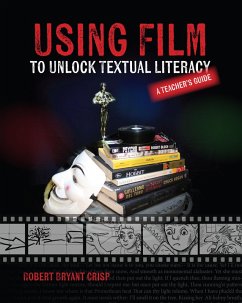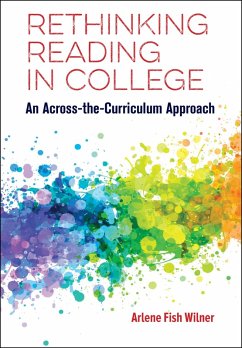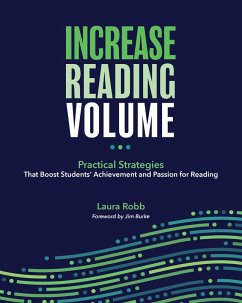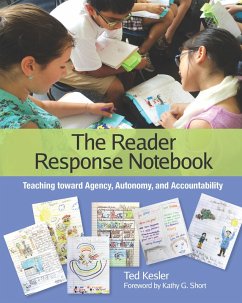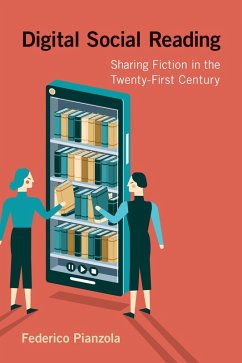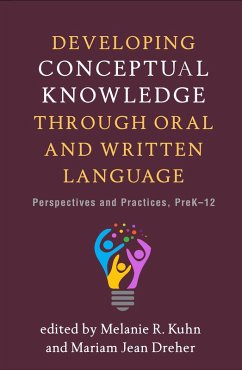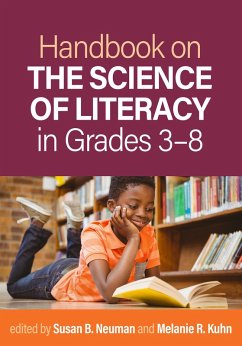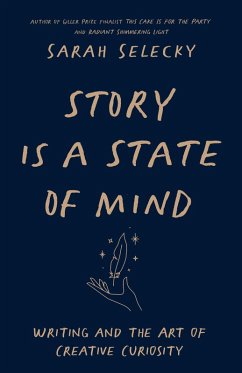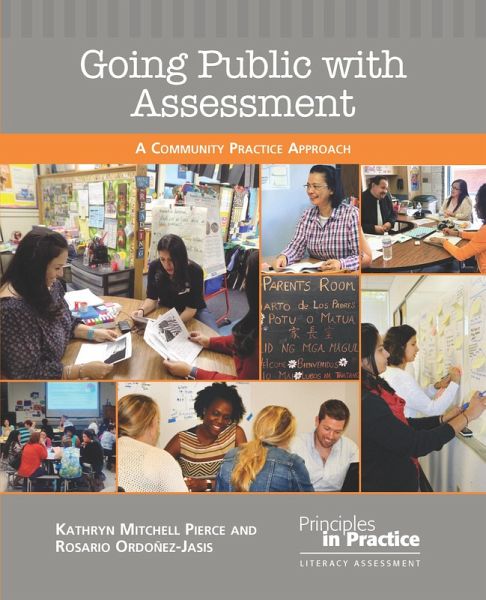
Going Public with Assessment (eBook, ePUB)
A Community Practice Approach

PAYBACK Punkte
7 °P sammeln!
The authors share classroom vignettes, strategies, and resources for going public with literacy assessment through teacher collaboration with colleagues, with families, and with the community.Teachers want assessment tools and strategies that inform instruction, engage students in the process, and invite families and community members to enter into the conversation about student learning and progress. When teachers work collaboratively with one another, they align beliefs and practices to generate new ideas that reflect the questions they are asking about literacy and learning. When students, ...
The authors share classroom vignettes, strategies, and resources for going public with literacy assessment through teacher collaboration with colleagues, with families, and with the community.
Teachers want assessment tools and strategies that inform instruction, engage students in the process, and invite families and community members to enter into the conversation about student learning and progress. When teachers work collaboratively with one another, they align beliefs and practices to generate new ideas that reflect the questions they are asking about literacy and learning. When students, families, and the community are invited to be active, engaged participants in these discussions, all stakeholders have an opportunity to create a shared vision for literacy learning and to construct assessment tools and strategies that help everyone answer the important questions: How as teachers are we engaging with one another over our literacy assessment beliefs and practices? and How can we better bring families and communities into these conversations?
In this volume of the Principles in Practice Literacy Assessment strand of books, veteran educators Kathryn Mitchell Pierce and Rosario Ordoñez-Jasis share classroom vignettes, strategies, and resources for going public with literacy assessment through teacher collaboration with colleagues, with families, and with the community. Drawing from the IRANCTE Standards for the Assessment of Reading and Writing, Revised Edition, and their own extensive experience, the authors have compiled a set of collaborative assessment principles, as well as a model for teacher professional development around assessment, to guide teachers from assessment theory to practical implementation in the classroom.
Teachers are at the heart of assessment conversations because they have up-close and personal experiences with how assessments impact their students. These experiences provide an invaluable perspective that is essential to all decision making about assessing student learning. But teachers don'tor shouldn'tstand alone. Their critical expertise is strengthened by the experiences and expertise of others invested in the success of our studentscolleagues, families, communities, and students themselves.
Teachers want assessment tools and strategies that inform instruction, engage students in the process, and invite families and community members to enter into the conversation about student learning and progress. When teachers work collaboratively with one another, they align beliefs and practices to generate new ideas that reflect the questions they are asking about literacy and learning. When students, families, and the community are invited to be active, engaged participants in these discussions, all stakeholders have an opportunity to create a shared vision for literacy learning and to construct assessment tools and strategies that help everyone answer the important questions: How as teachers are we engaging with one another over our literacy assessment beliefs and practices? and How can we better bring families and communities into these conversations?
In this volume of the Principles in Practice Literacy Assessment strand of books, veteran educators Kathryn Mitchell Pierce and Rosario Ordoñez-Jasis share classroom vignettes, strategies, and resources for going public with literacy assessment through teacher collaboration with colleagues, with families, and with the community. Drawing from the IRANCTE Standards for the Assessment of Reading and Writing, Revised Edition, and their own extensive experience, the authors have compiled a set of collaborative assessment principles, as well as a model for teacher professional development around assessment, to guide teachers from assessment theory to practical implementation in the classroom.
Teachers are at the heart of assessment conversations because they have up-close and personal experiences with how assessments impact their students. These experiences provide an invaluable perspective that is essential to all decision making about assessing student learning. But teachers don'tor shouldn'tstand alone. Their critical expertise is strengthened by the experiences and expertise of others invested in the success of our studentscolleagues, families, communities, and students themselves.
Dieser Download kann aus rechtlichen Gründen nur mit Rechnungsadresse in A, D ausgeliefert werden.





